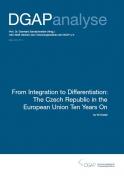The Czechs are among the most skeptical nations in the EU regarding the future of the European integration project – despite the massive inflow of foreign direct investments, the rise of its GDP in the first years after the accession, and the Czech Republic’s central geographic position in Europe. Moreover, the Czech economy is very tightly bound to the euro area, since its most important trading partners – Germany and Slovakia – use the single currency. The analysis tackles main trends in the Czech Republic’s EU membership and examines the country’s potential role in the EU. It concludes that, although the priorities of Czech EU policy are stable, the country’s political representation lacks interest in EU affairs.
From Integration to Differentiation
The Czech Republic in the European Union Ten Years On
The Czech Republic’s first ten years in the EU have been marked by several ups and downs. Though the Czech Republic increased its trade exchange and played important roles in several fields (such as the EU’s Eastern Neighborhood Policy, the internal market, EU enlargement, and energy), it also acquired a negative label thanks to its surprising positions.
Bibliographic data
Dostál, Vít. “From Integration to Differentiation.” May 2014.DGAPanalyse 9, May 10, 2014, 20 pp.

